Blackberry Review -- Smartphone Round Robin
Ah, Blackberry. If you think about it, Blackberry is the last of the "old guard" of smartphones still standing. Palm rebooted with webOS and Windows Mobile is looking to do the same with Windows Mobile 7. The (relatively) new players in the game, iPhone and Android, have introduced new philosophies and innovative features while Blackberry just keeps on churning, with its pager history on its back and keyboard tradition on the front, a Blackberry today is simply, yet unmistakably, a better Blackberry from yesterday.
And to tell you guys the truth, I love me some Blackberry. Even though it's a completely different experience compared to the Android experience, there's a lot to love and learn from Blackberry. Though it's not the most ideal device for me, I can definitely see why its so wildly successful. It's undoubtedly a unique experience. But there are obvious limitations to Blackberry, perhaps more so than any other platform, but hey, Blackberrys get things done, right?
See what Android Central thinks of the Blackberry platform in the full review below!
Hardware
Bold 9700
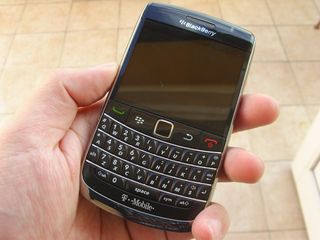
Any way you spin it, the Bold 9700 is a wonderfully built device, rock solid from head to toe, screen to keyboard. The Bold 9700 is especially a joy to use because it feels so good in the hand--it's nearly the perfect size, in both shape and depth, for a phone. There's really no Android device like it. Unlike last year's Bold 9000, which was a large and in charge device, the Bold 9700 has a smaller footprint that is much easier to handle. If you want to get nitpicky, you could complain that it doesn't feel like a true 'Bold' but rather more from the 'Curve' family of design. But it's a better device through and through.
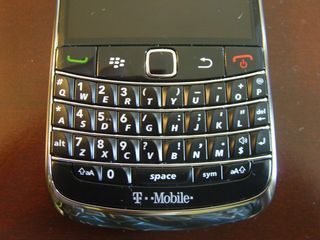
The Bold 9700 replaces the famed Blackberry trackball (of which some Android devices 'borrowed' from) with an optical trackpad. Many people consider the optical trackpad an ingenious solution because it fixes the previous trackball issues (dust buildup, gets mucky, etc) but I'm not sure it's absolutely, definitively better. Yes, it's nearly as accurate and A LOT easier on the eyes, but there were instances where I felt it misread my movements--I went passed the icon I wanted to press. Don't get me wrong, I would prefer an optical trackpad over a trackball any day (darn you Nexus One!) but I think it could be improved--I don't believe it's a perfect navigational method just yet. What would be cool is if Blackberry extended the optical trackpad to that entire row of buttons, that way you have more real estate to move around and the possibility of more advanced gestures.
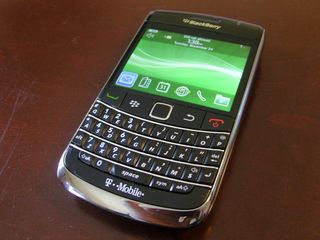
Because Android devices are seemingly married to large touchscreens, I was unsure if I could adapt my usage to the smaller screen of a Bold 9700. The screen is only 2.4 inches diagonal compared to the 3.7-inch screen of the Droid. And yes, there were times where I wanted a bigger screen but for the most part, the Bold 9700's screen did the job. It's absolutely clear enough, that's for sure. If Blackberry users are married to that form factor of front facing keyboard plus a screen (and to be fair, it's a great form factor), this really is their best solution.
Be an expert in 5 minutes
Get the latest news from Android Central, your trusted companion in the world of Android
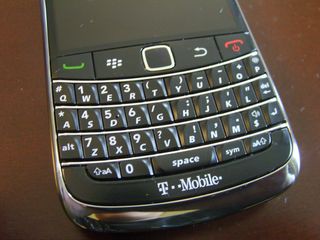
And if Android could steal a hardware feature from the Bold 9700 it'd be the keyboard, no question. The keyboard just flies--there's no learning curve--you'll be typing as fast as you can in no time. Some Android devices have physical keyboards yes, but it doesn't even come close to the efficiency of a Blackberry keyboard. It's likely due to the form factor, but it's very surprising that not one Android manufacturer has built a Blackberry-esque device, even if it was just to see if it could work.
Storm 2
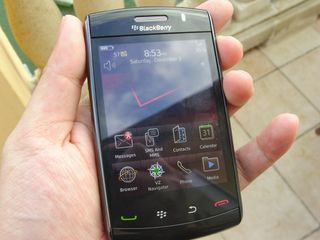
It was around last year's Round Robin when the original Storm was released and it was an important device for Blackberry because of the touchscreen nature of it. Sadly, that original Storm was an excuse of a device. It seemed undercooked, half-baked, and whatever synonym you can come up with just 'not being ready'. I was expecting the same with the Storm 2, firmly believing that RIM just didn't understand how to make a touchscreen device, but I could not have been more wrong. This is the phone that RIM should have introduced as the original Storm. The SurePress screen technology works in this sense. Touch to select, press to execute--definitely still within that Blackberry philosophy.
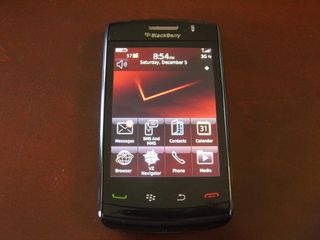
What's insanely cool about the Storm 2 is that its SurePress technology is further refined. Previously, it hinged on one single button, so there were weak points, wobbly points, and just non working points. This time, they introduced 4 buttons underneath the screen and it's electronically controlled meaning that when the device is off, it's impossible to click down. It's a small detail, but it's oh so cool in execution. It's these little details that the original Storm lacked, the little details that RIM usually addresses. Good to see it happen.
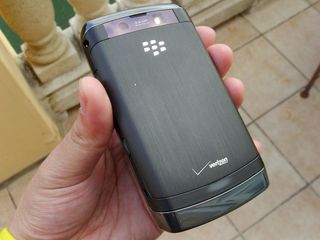
Overall, the build quality of the Storm 2 is stellar. Good choice of materials, purposeful weight, and great size. You get a larger screen too, so it's easier for touchscreen aficionados to familiarize themselves with. Surprisingly, I found the soft keyboard on the Storm2 to be very easy to use--in some cases, it's even better than the Android soft keyboard.
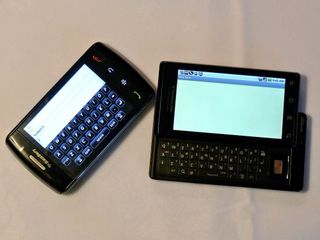
However, as much as I enjoyed the Storm 2, there's really nothing I would want Android to 'steal' from. The great build quality is nice but other than that, the Storm 2 fits the Blackberry philosophy of doing things better than the Android way.
The Blackberry Way
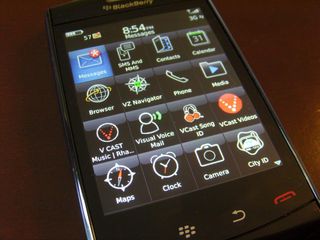
For most users who need a phone first, smartphone features second, a typical Blackberry like the Bold 9700 is perfect. Why? Because it's the smartphone that is the most 'phone'-like. There's no slider, no software keyboard, no ideas that seem too foreign. That's a plus when it comes to people who are used to featurephones, the Blackberry philosophy puts communication first, everything second. And there's a huge market for that, as can be seen by its sales, but I think as the smartphone market is evolving and the needs of a user becomes more diverse, Blackberry is lacking in that next level of usage. The browser is unimpressive, the homescreen experience is limited, and the philosophies of Blackberry is growing outdated. Smartphones aren't just to merely communicate anymore.
And by no means I'm saying the Blackberry way is bad. In fact, if you want a smartphone to be a communication device first and foremost, it's very hard to beat Blackberry. There's the excellent e-mail, there's the BBM, there's an easy way to contact your contacts and it's all wrapped under a package that puts communication first (as can be seen by the front facing keyboard). But if you want your smartphone to be more intensive, to be more like a small tablet computer than anything else, to feel as if you're using the future--you'll have to look elsewhere.
Lastly, and this only applies to a small, miniscule set of smartphone users, but darn the fact that your Blackberry is locked to your PIN. Darn the fact that you have to get a special specific Blackberry plan. And darn the fact that its e-mail is so stringent. 98% of smartphone users won't notice these issues but for those who like to bounce back and forth different platforms (like us), it's just too hard to do on Blackberry.
Where Does Blackberry Go From Here?
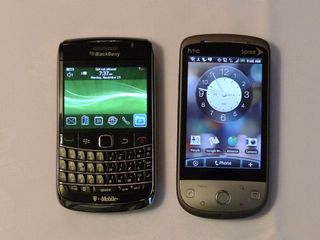
Let's be honest here, the Blackberry OS is tired. I don't even know what's different from last year. It's supposed to be BBOS 5.0 but for such a significant number, so little change can be discerned from the user-end. From what Crackberry Kevin tells me, a lot of the improvements are under the hood and are preparing Blackberry for the future. Good to know but not that good to use.
But yes, Blackberry gets things done and it gets things done fast--but that's about it. There's no innovation in notifications, no glamorous way to multitask, and no widgets to extend the homescreen experience. It's like using a device that is obviously shackled by its history. Blackberrys have nailed communication but have left everything else in the past. Things definitely need to be changed but it looks like RIM isn't looking to completely overhaul the BBOS. I guess if it's not completely broke so there's no dire need to fix it, right? But where does Blackberry go from here?
I posed that question to members of the Crackberry community and the large majority said apps. And to be honest, that's where every smartphone is headed. Aside from the iPhone, every smartphone platform needs not only more apps but better apps. And though Blackberry app situation may be limited right now, the fact that there are so many Blackberry users should assuage your fears--developers will develop for Blackberry because there's just so many users. Inelegant or not, numbers don't lie.
Browser
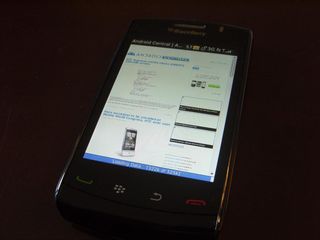
It's 2010. The Blackberry browser blows. It's unintuitive, slow, and just janky all around. It will get better when Blackberry introduces their Webkit based browser but for now this is without a doubt the worst stock browser in the smartphone space. Compare it to any other smartphone browser and it simply doesn't hold a candle. Browsing the web without a touchscreen just isn't as efficient to us Android users. Fix now.
The 'Crack'
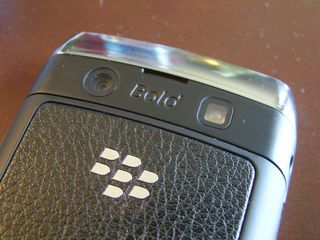
I was always under the impression that Blackberry can build a community like no other smartphone can. And that's true because every Blackberry is inherently tied to every other Blackberry because of how it's set up as a device. And things like BBM and push e-mail certainly help it's addictive nature but really Blackberrys--Crackberrys--are more than just that. It's the fact that everything on a Blackberry is geared toward staying connected to one another. The keyboard allows for wonderfully quick typing. The e-mail is instant communication. The notification light keeps the Blackberry within an arm's reach. The OS is super fast. BBM makes everyone feel together. Everything in a Blackberry is the 'crack'. The BBOS is limited to be sure, but I'm not afraid to say that Blackberry is the most unique smartphone platform available. Those who use and love Blackberrys just won't find the same experience on another device.
And the Blackberry as we know it is iconic. From the Curve 8310 of the very first Round Robin to the Bold 9700 of this year's, a Blackberry user is at home with both devices. If you've used a Blackberry, you can use any Blackberry. There's nothing that is so drastically different from device to device. And I'm jealous of that--with Android we get so many different form factors and different software built on top of our OS that you have to almost re-learn an Android device every time. RIM makes sure every Blackberry user can easily pick up any Blackberry and just go.
To analogize it, Blackberry is really the McDonalds of smartphones. Sure it may not be the highest quality of food or offer the most variety but it's always consistent. You eat at McDonald's in California or in Florida or in New York or even in Canada, you know what to expect. That's Blackberry--from the Curves to the Bolds--it might not offer the highest quality of experience or different form factors but you know what to expect. And really, that's saying something. In order to build a device that's consistently better each year but still falls in line with previous iterations, that means you absolutely built a great base to build on. That's where the 'crack' lies, at the core base of Blackberry. No other phone matches its nod to its history.
Final Thoughts
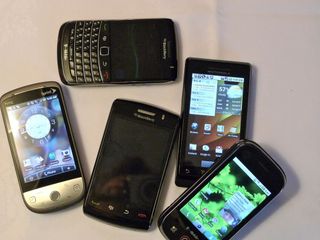
If you're a reader of CrackBerry.com, you should be well aware of Crackberry Kevin's Hierarchy of Smartphone Needs. If you haven't heard of it, go read it and take it in. We're sure that your pyramid of needs is different from his but a lot of it makes sense. Your device should fit your priorities. If you're a heavy Google user invested in Google Voice, Gmail, and the like, Android is really your best bet. If it's strict, fast and quick communication that you need, Blackberry makes a great case for itself. If AT&T doesn't work for you, don't get an AT&T phone. And so on.
And that's really what you learn from doing these Smartphone Round Robins. There is no perfect device for everyone. If you're insanely, ridiculously lucky, maybe there is a perfect device for you. But for the most part, if you can find a device that best fits your priorities, go with that device. If you want a device that browses the internet, Blackberry is not for you. If you want a device that communicates extremely well, Blackberry it is.
So what the future holds for Blackberry (and really any smartphone platform) is what device can combine enough core needs better than any other device. If Blackberry fixes their browser and introduces a touchscreen device with front facing keyboard, it's definitely going to be a device worth reckoning. But if it takes too long, Android just might pass it up.

